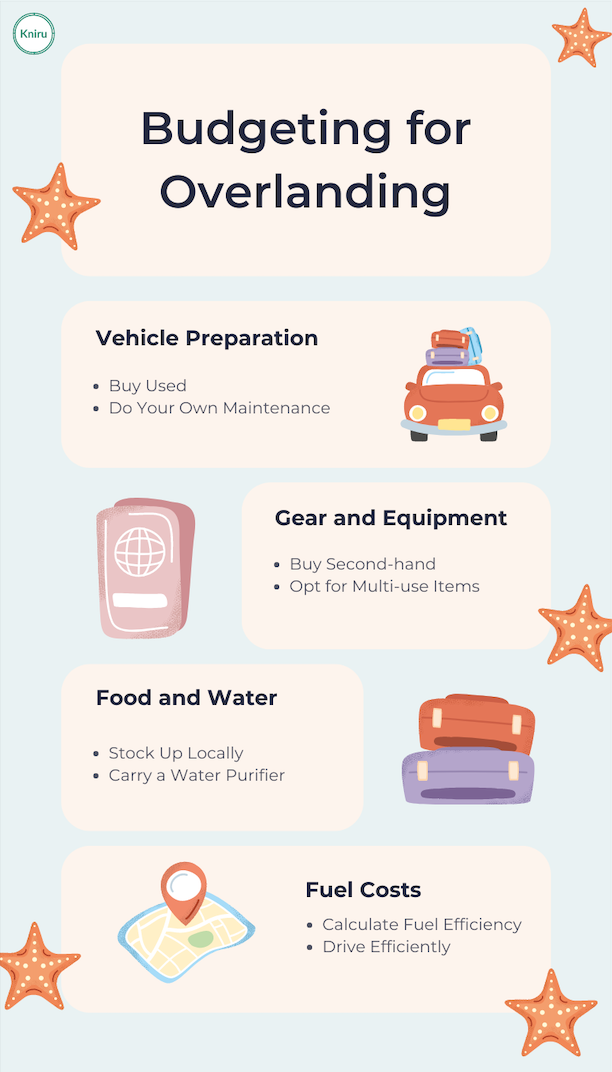Overlanding on a Budget: An In-depth Guide for 2024
This guide provides budget-friendly strategies for overlanding, focusing on choosing affordable vehicles, performing self-maintenance, and planning cost-effective routes. It highlights cost-saving tips like buying second-hand gear, cooking meals, and engaging in low-cost local activities to ensure a rewarding and economical overland adventure.
Abhinil Kumar
Author

Embarking on an overland adventure is an exciting prospect for anyone who cherishes the great outdoors and the thrill of exploring the road less travelled. However, setting out on such journeys often comes with a significant cost, especially when considering the price of suitable vehicles and essential gear. This comprehensive guide is tailored for adventurers on a budget, detailing how to manage costs while maximizing the experience of overlanding effectively.
Understanding Overlanding
Overlanding is a unique form of adventure travel that involves exploring remote locations by self-reliant overland transportation, typically with four-wheel-drive vehicles. The term “overlanding” originates from “overland,” a reference to crossing large expanses of land instead of seas or air. Historically, overlanding was a term used to describe the arduous journeys made by Australian settlers who traversed the continent’s vast outback. Today, it has evolved into a leisure activity that combines off-road driving with the spirit of self-sufficient camping and exploration.
The concept of overlanding is rooted in the desire to explore rather than to reach a specific destination quickly. It’s about the journey and the experiences along the way. Overlanders embrace the challenge of travelling through difficult terrains, which often involves navigating unpaved roads, mountains, and deserts. It’s not merely a road trip but an immersive experience that offers opportunities to engage with different cultures, landscapes, and wildlife, promoting personal growth and environmental awareness.
As a modern activity, Overlanding focuses on sustainability and the ability to adapt to diverse environments while being mindful of ecological impacts. This form of travel is about connecting with the world in a profound way, making it an enlightening experience for those who seek adventure beyond traditional tourism.
Planning Your Overland Journey
Planning your route is an essential part of overland adventures. Use online resources and overland travel forums to find routes that are suitable for your vehicle’s capabilities and your driving skills. Plan your route to include stops at affordable campsites or areas where free camping is allowed, which can significantly reduce the cost of accommodations.
1. Define Your Destination and Route
Start by defining your overland destination. Choose locations that are not just safe but also budget-friendly. Countries in Southeast Asia, parts of Eastern Europe, Central America, and Africa are popular for their affordability and diverse landscapes. Plan your route considering fuel costs, visa fees, and potential road tolls.
2. Seasonal Considerations
Travelling off-season can significantly reduce your expenses in terms of accommodations and activities. For instance, visiting tourist spots in the shoulder season means fewer crowds and lower prices.
Budgeting for Overlanding
1. Vehicle Preparation
Choosing the right vehicle is a cornerstone of successful overlanding on a budget. It is essential that the vehicle is not only reliable and capable of navigating varied terrains but also cost-effective. For budget-conscious adventurers, selecting older vehicles can be a practical decision. Vehicles that are around 22 years old, for instance, strike a balance between affordability and functionality. These vehicles, including models from the years 1984-1988, often provide the rugged durability required for overland travel without the hefty price tag of newer models.The preference for older vehicles like these isn’t just about their lower upfront cost. Overland enthusiasts often choose these models for their proven track record of durability and simpler mechanics, which make them easier to repair without advanced tools or technology. Brands like Land Rover and American Expedition Vehicles are particularly favored in the overlanding community due to their historical reliability in tough conditions. Such vehicles are celebrated for their ability to endure hundreds of miles of challenging terrain, a critical feature discussed extensively in online overlanding forums and communities.
When scouting for a budget-friendly overland vehicle, prioritize models known for their fuel efficiency to manage long-term travel expenses better. Additionally, choosing a vehicle known for minimal mechanical issues will reduce maintenance costs over time. Engaging with online forums dedicated to overlanding can provide insights into specific models that are best suited for prolonged rugged conditions.
- Buy Used: Opting for a second-hand vehicle can significantly reduce costs while still meeting all your overlanding needs. Look for vehicles that are renowned for their durability and low maintenance demands.
- Do Your Own Maintenance: Acquiring basic vehicle maintenance skills such as changing tires, oil, and filters not only cuts costs but also enhances your self-sufficiency on long trips. This can be invaluable when traveling through remote areas where professional help may not be readily available.
2. Gear and Equipment
Once you have your vehicle, equipping it with the necessary overland gear is the next step. Budgeting wisely here is crucial. Prioritize essential recovery gear and modifications over luxurious upgrades. Basic vehicle maintenance tasks like ensuring good quality disc brakes and a strong suspension system are essential and cost-effective compared to more extravagant modifications.
Budget-friendly modifications might include adding a second-hand roof rack or affordable aftermarket parts that enhance storage and utility without breaking the bank. Avoid overspending on fancy gear that looks appealing but offers little practical value. Instead, focus on investing in quality, essential items that directly contribute to the safety and functionality of your vehicle during overland adventures.
- Buy Second-hand: Check online marketplaces for second-hand gear.
- Opt for Multi-use Items: For example, a scarf can be used for warmth, as a pillow, or as a makeshift bag.
3. Food and Water
Plan to cook your own meals, as it’s cheaper and safer when you’re off the grid.
- Stock Up Locally: Buy from local markets to save on meal costs.
- Carry a Water Purifier: This can be a lifesaver in remote areas and saves buying bottled water.
4. Fuel Costs
Fuel is one of the biggest expenses in overlanding.
- Calculate Fuel Efficiency: Know your vehicle’s mileage and plan your fuel stops accordingly.
- Drive Efficiently: Maintain a steady speed to save fuel.

Budgeting for Overlanding
Itinerary Tips
1. Slow Down
The slower you travel, the less you spend. Long stays in one location can reduce your daily costs significantly. Take time to explore each location thoroughly instead of hopping quickly from one spot to the next.
2. Local Experiences
Engage in local activities that are often free or low -cost. Hiking, swimming in local lakes, or even volunteering can enrich your experience without costing much.
Accommodation Options
While camping is the go-to for overlanders, here are some budget-friendly alternatives:
- Hostels and Guesthouses: In many countries, these are cheap, and you get to meet other travelers.
- Homestays: Staying with locals not only cuts costs but also enriches your cultural experience.
Navigating Challenges on the Road
1. Insurance
Opt for vehicle insurance that covers international travel and personal travel insurance. While it seems like an added cost, it can save you from potentially high expenses due to accidents or health issues.
2. Emergency Preparedness
Carry a basic repair kit and first aid kit, and always have an emergency contact plan. Know the nearest embassies and local emergency numbers, and always inform someone about your travel plans.
3. Border Crossings
Research the visa requirements and any border-crossing fees. Some countries have easy online visa applications which are cheaper than getting visas on arrival.
Final Thoughts
Finally, remember that overlanding is as much about the journey as it is about the destination. Embrace the spirit of adventure by enjoying the natural landscapes and the freedom of the open road. Keep an open mind and be flexible with your plans—sometimes, the best experiences come from unexpected detours and challenges.
By carefully selecting a budget-friendly overland vehicle, equipping it with essential gear, planning a cost-effective route, and choosing durable camping essentials, you can embark on an unforgettable overland journey without exceeding your budget. With thoughtful preparation and a focus on practicality, your overland adventure can be as enriching as it is economical.
FAQs
1. What is overlanding? Overlanding is a form of adventure travel that involves exploring remote locations via self-reliant, overland transportation, typically using four-wheel-drive vehicles. It emphasizes the journey and self-sufficiency rather than reaching a specific destination quickly.
2. How can I overland on a budget? To overland on a budget, choose older, reliable vehicles, do your own maintenance, buy second-hand gear, cook your own meals, and plan fuel-efficient routes. Engaging in local activities and opting for budget accommodations like hostels and homestays can also help reduce costs.
3. What are some budget-friendly vehicle options for overlanding? Older vehicles, particularly those known for their durability like certain models of Land Rover and American Expedition Vehicles, are often preferred. These vehicles are generally more affordable and easier to repair without advanced tools.
4. How can I manage food and water costs during overlanding? Plan to cook your own meals using locally sourced ingredients to save money. Carry a water purifier to avoid the cost and environmental impact of buying bottled water.
5. What should I consider when planning my overland route? Choose routes that suit your vehicle’s capabilities and your driving skills. Look for affordable campsites or free camping areas. Consider travelling off-season to reduce costs related to accommodations and activities.


